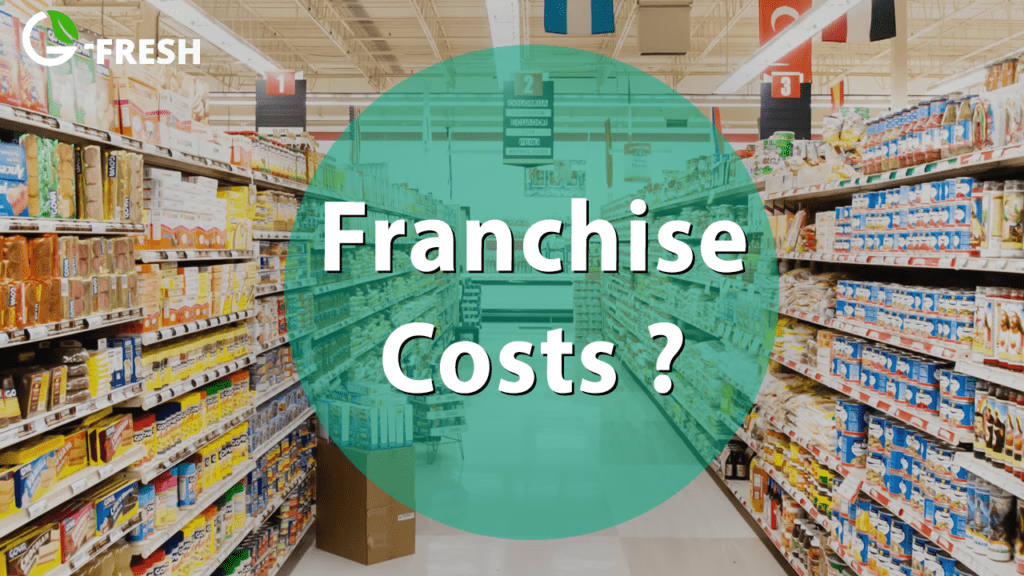How to calculate supermarket franchise cost in India?
The retail sector in India, especially the supermarket sub-segment, has experienced rapid growth over the past few years. When more and more consumers start using supermarkets for the convenience and the sort of varieties they offer, the chain pattern is bound to flourish. Nevertheless, determining the upfront supermarket franchise costs of entering the business properly is of utmost importance for potential entrepreneurs to make reasonable choices and plan for future profitability.
This extensive guide is going to analyze the elements that lead to the total cost of setting up of a supermarket franchise cost in India. From royalties to real estate, we’ll help you plan how to invest in the right type of equipment and staffing for your business.

Supermarket Franchise Cost Fee:
Among the key and initial expenses that are required when analyzing a supermarket franchise cost is the franchise fee. This one-time fees, paid to the franchisor, gives you the permission to use the brand name, business model and the operational support systems. The amount of franchise fee that supermarket franchise in India have to pay ranges between Rs. 10 lakh to Rs. 50 lakh or even higher according to many variables affecting the case.
Franchisor’s brand reputation and market presence is a vital factor in setting the franchise fee. Well-settled chains with a more prominent customer base and demonstrated success in business would be paid higher fees. So, if you partner with a famous brand like Big Bazaar or GFresh, the initial supermarket franchise cost can be as high as ₹30 lakhs.
Furthermore, franchise location and size also affect the fee, with prime spots and larger stores often having greater investments. A franchise in the downtown business district of a major city may have a higher franchise fee than the vice versa, such as a small town or a suburban location.
Apart from that the support and training provided by franchisor can be another important factor to determine the fee in the franchise. Some franchisors could offer a more complete training program, operational support and marketing assistance for which the fee would be negotiated accordingly.
The franchise fee needs to be appropriately evaluated in light of the brand value, market potential, and the franchise support services offered by the franchisor. Although the higher franchise fee may seem burdensome at first, it could be justified if the brand and business model have been successful and provide ample growth possibilities.
Real Estate and Rental Supermarket Franchise Cost:
Location is key in analyzing the supermarket franchise cost because it just make it easy to locate the shop and bring the traffic. Picking up a place that will be appointed either by buying or renting might be a significant investment.
There exists a widely-ranging-level of costs in property buying process when the person intends to buy a specified place which greatly differs in terms of the city, neighborhood and the size of the space. For instance, in big towns such as Mumbai, Delhi and Bengaluru, prime commercial property in high-foot-falls areas can cost roughly 60-80 crores for a 1,000-1,500 square feet space.
Let’s consider this for example; acquiring a freehold property in Bandra, Mumbai for a supermarket franchise cost in prime location will cost around ₹10-12 crores, whereas the same size property in a residential area like Andheri could be ₹6-8 crores.
On the contrary, most franchisors prefer a leasing arrangement since it is very popular for new franchises or with mallet capital. Nevertheless, the bills will not come for free, the supermarket franchise rental costs can be quite appropriate as well, ranging between ₹50/- and ₹200/- per square foot per month, depending on the location and size of the property.
In a metropolis like Delhi, a retail space of ~10,000 sq. ft in prime locality like Connaught Place can cost ₹1.5 -2 crores per annum and ₹80 lakhs-1 crore in a commonly used neighborhood like Dwarka.
Once again, lease conditions like duration, lock-in time, increase clauses, and security deposit should be carefully evaluated because they could affect your supermarket franchise rental cost significantly and would make business unprofitable.
The imperative is to strive for a compromise between a location with high foot traffic with customers and financially reasonable real estate or rental costs that do not drain the budget. The most effective way of minimizing your real estate costs is probably market research, efficient negotiation and agreeing on revenue-sharing models.
Must Read: Budget Planning for a Supermarket Franchise
Build-out and Renovation Costs:
Renovation and build-out are another major factors when considering supermarket franchise cost. If you do reach an agreement of mere space renting, your space will require build-out and renovation costs to transform it into a commercial supermarket facility. The expenses can encompass demolition, construction, plumbing, electrical work, and installation of fixtures and equipment.
The quantum of build-out fluctuates depending on the factors, which include store size, product placement complexity, the quality of materials and surface finishing. Well, on an average, shop frontage costs may range between Rs. 1500 and Rs. 3000 per square feet. Massive or exquisite display may end up with even more capital investment.
In a built space of 10,000 sq ft area, building supermarket franchise cost alone can vary from ₹1.5 crores to ₹3 crores or even more depending on the space requirement. This can include expenses such as:
- Demolition and site preparation: 10- 20 lakhs
- Civil and structural work: 30-50 lakhs .
- Plumbing and electrical installations: 20-40 lakhs
- Flooring, false ceilings, and interior finishes: 30-60 lakhs
- Specialized equipment like chillers and freezers: 20-40 lakhs
- Racking, shelving, and checkout counters: `15-30`lakhs
Furthermore, indoor air quality, space, and customization can add a substantial amount to the leasing factor, with regards to the supermarket franchise cost.
It is a must to closely cooperate with the experienced builders, architects, and the design team of the franchisor in order to specify that all operational requirements, brand standards and local rules are followed. Effective planning and budgeting of these expenses is necessary to avert supermarket franchise costs overruns as well as project delays to be able to open the store on time.
Equipment and Inventory
Providing a supermarket with relevant infrastructure and filling it with inventory is one of the most expensive areas. Essential equipment comprises refrigerators, freezers, racking systems, checkout counters, security systems, and points-of-sale terminals.
Acquiring or renting this equipment can sometimes be very expensive and the cost can go up or down depending on whether the store is small or big, the quality of the goods and the availability of the supplier. The capital cost of equipment for a supermarket franchise can vary from 50 lacs to 2 crores or more.
Below we look at some common costs of supermarket franchise equipment:
- Refrigeration units (walk-in coolers/freezers): ₹10-30 lakhs
- Chilled display cabinets and freezers: ₹5-15 lakhs
- Shelving and racking systems: ₹5-15 lakhs
- Checkout counters and POS systems: ₹3-8 lakhs
- Security systems (CCTV, access control): ₹2-5 lakhs
Moreover, purchasing opening stock like dry goods, produce, and perishables can be an intensive initial outlay. At the same time, there are inventory expenses that may range between 20 lakh to 1 crore or even higher depending on factors such as the range of products, linkages to vendors and store size.
For example; a 10k sq ft. grocery store with varied merchandise may necessitate an initial investment in inventory amounting to 50 to 80 Lakhs including;
- Dry groceries and packaged goods: ₹ 15-25 lakhs.
- Fresh produce: ₹10-15 lakhs
- Dairy and chilled products: ₹8-12 lakhs
- Meat and seafood: ₹5-10 lakhs.
- Household and personal care products: ₹1-5 lakhs.
Smart inventory management, mastering use of supplier credit terms, and enhancing product assortment can be the keys in reducing the risk of carrying supermarket franchise costs and product wastage.
It is a good idea to carefully conduct a research on equipment suppliers, to reach an agreement on volume purchase discounts and to consider leasing options to manage these expenses in the most productive way. Moreover, partnering with the franchisor’s procurement team can offer the above-mentioned rates and hassle-free ordering processes.
Licenses, Permits, and Insurance:
Operating a supermarket franchise is associated with a wide range of legal statutes, so that obtaining all the relevant licenses and permits is mandatory. These may include trade licenses, food safety certifications, and environmental clearances etc. The provision of licenses and permits may have different amounts based on the location and size of the store, but generally can concentrate between ₹50,000- ₹2 lakhs or even higher.
Some of the key licenses and permits required for a supermarket franchise in India include:
- Trade License: A local body corporate issues the business license which, however, operational, become a requisite of its approval for its performance. Relying on various sources for public transportation can cost from ₹10,000 to ₹50,000 a year (per person) according to different services.
- Food Safety and Standards Authority of India (FSSAI) License: Ecommerce stores might contain the devices that are needed to process and sell food products. The charges various from ₹2,000 to ₹50,000 depending on the difference in the turnover.
- Shops and Establishment License: This is a mandatory requirement not only for staffing of employees, but also for regulating working environments as well. The cost may be anywhere between ₹5,000 to ₹25,000 in a year.
- Environmental Clearances: According to store size and location clearances of pollution control boards, approval would run from ₹10,000 to upwards of ₹500,000.
- Fire Safety and Building Approvals: Compulsory for the safety concerns, as the costs will differ based on the store size and local regulations.
Furthermore, it is crucial to find the insurance that will be covering general liability, product liability, and occupational accident insurances. The premium payments for such coverage range between ₹1 lakh to ₹5 lakhs and beyond, a variance which is dependent upon number of employees, the size of the store, and the type of coverage desired.
Including such expenditures in the planning stage and making sure adhering to the legislation deadlines are vital. A failure to secure the essential permits and licenses may land you in fines, lawsuits, and even closure of your business.
Consulting legal experts, as well as working hand-in-hand with franchisors’ regulatory compliance team, are important to cope with regulation issues such as helping devices run smoothly and correctly.

Staffing and Training:
A qualified and motivated workforce is the key element for the everyday existence of any supermarket. Staffing costs are one of the most expensive operations of a company and they include salaries, benefits and training costs.
Indian supermarket franchise costs show wide-ranging variations depending on the employer’s location. Factors influencing personnel expenses , such as minimum wage, employee benefits, and size of workforce, can be situation-specific. If you’re running a regular mode, you can estimate paying up to 10% of total revenue on employee salaries, excluding benefits and training programs.
For example, the staffing costs for a medium-sized supermarket franchise cost with annual revenue of ₹10 crores and smaller business may amount to ₹50 lakhs to ₹1 crore or even more. Here’s a breakdown of typical staffing expenses:
- Salaries and Wages: For its staff of 30-40 personnels that include cashiers, stockers, department managers and support staff, the annual salary expenses could be from ₹30 lakhs to ₹60 lakhs.
- Employee Benefits: These can comprise of provident fund contributions, health insurance and other statutory benefits, which amounts to 15-25 per cent of the salary expenses.
- Training and Development: Investing in training for new recruits as well as periodic skill improvement programs for existing worker should cost about ₹2-5 lakh for a medium sized supermarket franchise in a year.
In addition to these direct monetary costs, staffing would also incur many indirect expenses, for example recruitment, onboarding, and employee retention difficulties. High employee turnover can greatly influence productivity and customer service, so it is vital to form fair compensation plans and creating a positive work environment.
Partnering with the franchisor’s Human Resources team can provide learning materials, insights on how to staff properly, as well as economical efficiencies through centralized recruitment and benefits coverage.
Sufficient scheduling, the process of cross-training employees, and also utilization of technology for processes like self-checkouts can help in optimizing the availability of staff and ensure that more supermarket franchise cost are not incurred without compromising the customer service delivery.

Marketing and Promotions:
Marketing and advertising should be productive to draw and direct consumers in the extremely competitive supermarket franchise industry. They may incur expenses such as advertising campaigns, branding initiatives, loyalty program, and in-stores shows.
During a given financial year, the advertising budget can fluctuate between 1 and 5% of your income. It is dependent on the consumer you are targeting, the level of competition in your area and the marketing channels that you have planned to use. A typical small supermarket franchise cost with a revenue of about ₹10 crores can afford to allocate somewhere in the region of ₹10 lakhs to ₹50 lakhs or even more as their advertising budget.
This is a breakdown of common promos and marketing expenses:
- Print, TV, Radio Advertising: ₹3-10 Lakhs
- In-store Promotions & Sampling: ₹2-5 Lakh
- Loyalty Programs & Direct Marketing: ₹2-8 Lakhs
- Social Media And Digital Marketing: ₹1-5 Lakh
- Local Event Sponsorships & Community Outreach: ₹1-3 Lakh
Online marketing, social media promotion, and on-site community engagement are among recent trends directed at modern consumers. However, print as well as TV channels as advertising media is also effective especially in terms of demographic reach e.g younger or older audience groups.
More so, franchisor can also provide co-branded marketing materials, national advertising campaigns and advice on promotions which can make your local marketing initiatives consistent and effective.
An integrated marketing plan should be developed that is tailored to the target market segment but incorporates both traditional and digital channels and communicates USP effectively. Continuous monitoring and improving your marketing strategies by performance metrics and customer feedback help you in enhancing your return on investment made in marketing.
Ongoing Costs and Profitability:
Apart from the start-up costs, there are other ongoing operational supermarket franchise cost expenses such as utilities, maintenance, royalties, inventory replacement etc. These costs could be as low as 15% of sales or equally as high as 25% of sales and must be carefully managed to return a profit.
Some of the key ongoing costs include:
- Utilities (electricity, water, gas): Usually about 2-4% of revenue
- Maintenance & repairs: Generally about 1-3% of revenue
- Franchise royalties: Typically around 4-8% of gross revenue
- Inventory replenishment: Varies with sales volume but approximately 50-70% COGS
- Marketing & Promotions: Typically within the range of 1–5 % revenues
- Rent (if leasing): No way to tell for sure but it might run from a quite small number to more than half depending on location
Strategic decisions in supermarket franchise cost management, such as deploying energy-saving systems, using technology for inventory tracking and bartering with suppliers for best terms, will be of immense importance to minimization of these recurring costs.
Though a big capital may be required initially, supermarkets can become very profitable if only they are managed in a useful way. The conventional profit margins for supermarkets usually vary from 2% to 5%, and therefore larger and more established chains might reach higher margin rates.
A supermarket franchise cost with ₹10 crore in annual revenue and a 3% net profit margin can yield a profit of around ₹30 lakhs in a year. Nonetheless, financial performance can be unpredictable due to influences like location, operational effectiveness, competition, and the extent to which customers return to you.
To maximize profitability, it’s essential to implement effective cost-control measures, optimize inventory management, and continuously monitor and adapt to changing consumer preferences and market trends. Additionally, exploring complementary revenue streams, such as pharmacy services, food courts, or online ordering and delivery, can further enhance profitability and customer convenience.
Successful supermarket franchises not only provide excellent products and services but also prioritize customer experience, operational excellence, and strategic growth initiatives to maintain a competitive edge and sustain long-term profitability.
Final Reflections!!
Determining the supermarket franchise cost in India is an all- inclusive process that includes franchising fees, real estate expenses, staffing and advertising bills. Albeit expensively paid earlier on, a well-structured and maintained supermarket franchise can give rise to the highest profit margins as well as continued growth.
To start with there should be extensive market research, search for experienced franchisors or consultants and prepare a business plan that will have to reflect all possible risks and costs including financial rewards. By means of astute planning, effective implementation and relentless commitment to deliver excellent customer service, you raise your chances of surviving in the competitive but lucrative Indian supermarket franchise sector.
